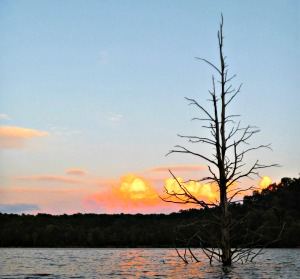The NC Senate today gave tentative approval to the state budget on a second reading, with mixed news for the environment.
Water Quality
 The budget funding and policy provisions addressing GenX are an improvement over similar provisions in companion bills filed by the House and Senate (House Bill 972/Senate Bill 724).
The budget funding and policy provisions addressing GenX are an improvement over similar provisions in companion bills filed by the House and Senate (House Bill 972/Senate Bill 724).
But the section of the proposed budget (Senate Bill 99) that addresses GenX and emerging contaminants still fails to provide the Department of Environmental Quality (DEQ) with adequate resources to respond to contamination by GenX or per- and poly-fluoroalkyl substances (PFAS) across the state. The majority of funding to deal with this contamination (about $5 million) would go to the N.C. Policy Collaboratory at UNC rather than to DEQ, the agency responsible under federal law for enforcement of water quality laws.
In other water quality impacts, the budget includes policy language that would further delay the Jordan Lake cleanup rules that were supposed to go into full effect in 2009 but have not to date. The budget would also delay implementation of the Falls Lake cleanup rules. This is inconsistent with the demands of the Clean Water Act and the need to protect our waters. These lakes provide drinking water to more than 750,000 people in the Triangle and are valuable recreational areas.
On a more positive note, conservation funding - including the Clean Water Management Trust Fund, Parks and Recreation Trust Fund, and Agricultural Development and Farmland Preservation Trust Fund - was increased by more than $22 million. Land conservation plays an important role in protecting water quality.
Going Backwards on Clean Transportation
The transportation sector is now the biggest contributor of climate change emissions in the United States. Electrification of this sector is generally acknowledged to be a key element of economic competitiveness going forward. But the legislature appears determined to stymie North Carolina’s transition to a clean transportation future.
A provision in the budget appears intended to kill the planned Orange-Durham light rail project. The provision sets up a “catch-22” by requiring that any light rail project secure federal funding before it can become eligible for state funding, though the federal government requires state funding to be secured first. If the Orange-Durham project is killed, it could mean a loss of more than $1.2 billion in federal funds.
The budget may also put at risk $92 million in Volkswagen settlement funds that are intended to compensate North Carolina for pollution caused by Volkswagen’s emissions cheating scandal. The budget would require that the VW settlement funds go into the N.C. State Treasury and then be distributed via an appropriation by the N.C. General Assembly, rather than go directly from the official VW Settlement Trust to DEQ and then to third parties. There is no apparent reason for this process that would justify the risk it carries of losing the federal funds, which DEQ plans to use for electric vehicle infrastructure and other clean transportation investments.
In response to the legislature’s proposed budget, Margaret Lillard, communications coordinator for the N.C. Sierra Club, issued the following statement:
"Clean, safe drinking water and a modern transportation system are things all North Carolinians can get behind - but apparently not all legislators. The majority party of the legislature appears to continue to be more focused on meddling with and micromanaging the executive branch than ensuring a clean environment for all North Carolinians.
"Had a democratic process been followed in developing and passing the budget, the outcome might have been more favorable to the public interest."